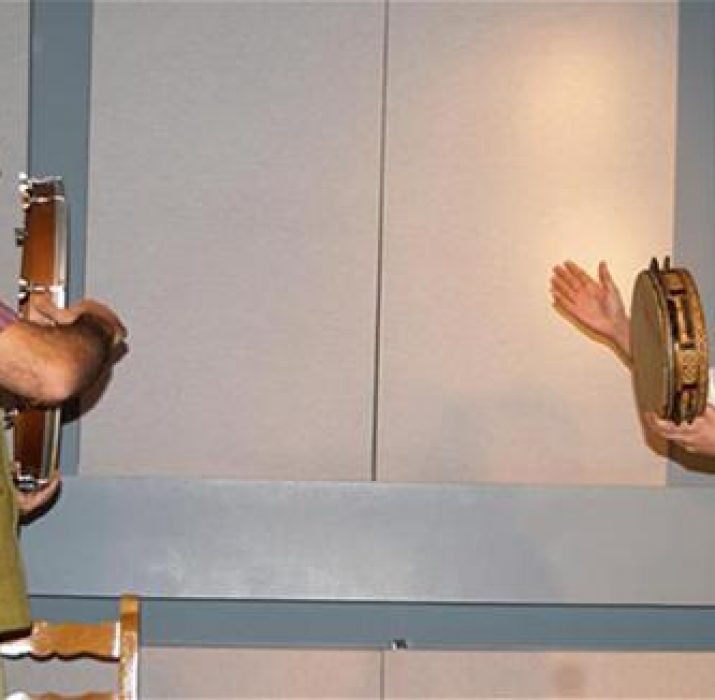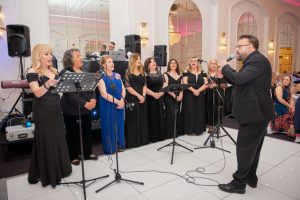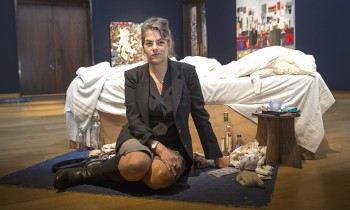Turkey’s Nasreddin Hodja enthralls Greek audiences
Turkey’s Nasreddin Hodja — a unique and entertaining character from Turkish folklore — has found a new home in an unlikely setting: Greece.

Turkey’s Nasreddin Hodja — a unique and entertaining character from Turkish folklore — has found a new home in an unlikely setting: Greece.
At a special storytelling event in Athens recently, stories of the Hodja — a kind of a mixture of the fool and wise man — were read out by husband and wife team Panagiotis Kokkoris and Turkey-born Gözde Atalay-Kokkoris.
The duo share their Turkish and Greek heritage to bring Nasreddin Hodja to new audiences and delve into the shared language, stories and traditions which stretch from Anatolia into the Balkans.
Gözde and Panagiotis’s combined narration of folk tales in both Turkish and Greek captivated the audience at the Gallery Dimiourgon in Athens.
Gözde, a theater actress, studied at Istanbul University and in London. When she met her future husband at a performance project in northern Greece it marked the beginning of a unique cultural partnership.
The two of them got married and together they spread their passion for art performance and their love for their two countries through folk story telling.
“I feel like home when I’m in Greece,” Gözde told Anadolu Agency. “I never felt I’m a foreigner here. I am almost a year and a half here and I never felt different, I feel like I’m home.”
Kokkoris has the same feelings for Turkey: “You know, when I first visited Turkey, people when they heard I’m Greek called me friend, komşu [neighbor in Turkish] and bacanak [brother-in-law].
“Then they would invite me to sit down and drink our tea; it was incredible for me what I felt.”
“Greeks and Turks are so similar and when I am in Turkey I feel like home,” Kokkoris added.
This familiarity with each other’s cultures crosses over into their enthusiasm for Nasreddin Hodja, whose tales often contain moral lessons or folk wisdom.
Gözde spoke about the tales of the Hodja with much admiration: “I love to narrate such stories. It makes me happy, and it’s like sharing a piece of my childhood, our past, with people everywhere, like what we did today and making it known to people.”
“For us, it’s very emotional to bring here to Greece the story of Nasredin Hodja, because it is always a beautiful thing to see these two languages together.”
“We have 5,000 common words”, Gözde added, “which we use in our stories. Sometimes, we have a similar humor, so when these two languages meet each other it’s a beautiful combination, which the audience also finds very interesting.”
“Many times I heard from people who listened to us narrating stories in Greek and Turkish that they found this combination amazing,” she added.
Trickster and wise man
Older generations of Greeks who used to live in Anatolia and are familiar with the story of the Hodja, loved to listen to the narration in both languages, Gözde said.
Even Greece’s famous Aesop’s Fables often bear striking similarities to the Hodja’s stories.
“The first inspiration and proposal for this performance came from one of my husbands’ storytelling teachers, Dimitris Prousalis,” Gözde said.
“It is a fascinating journey for me, telling a story that has been molded and influenced by so many people, so many places to the story it is today,” she added. “This is what I love most, to share these moments with the audience; we connect with them in a different way than in theater performances.”
The legend says that Nasreddin Hodja came from Eskişehir in central Turkey and spent his last days in Akşehir, near the Anatolian city of Konya, in the 13th century.
Akşehir is also home to the International Nassredin Hodja Festival which takes place for five days every July.
“The Hodja is considered to be a wise man” Gözde explained. “His stories have traveled from several cities around Turkey and the Balkans from mouth to mouth and each story has one small touch from all the places it passed from.
“The stories of the Hodja most of the time have a deeper meaning than being just a simple story.”
“The interesting thing is that each person sees each story from a different view. Not everyone today got the same message from Hodja’s story; everyone has a different imagination, gets different vibes, but the most important thing is that the core of the story stays the same,” she said.
Funny, witty, even foolish, but also wise, the beautiful thing about Hodja’s character, says Gözde, is that he shares two elements — those of the trickster and the wise man.
The stories of Nassredin Hodja were also performed last year at the Athens International Storytelling Festival under the sponsorship of the Turkish Embassy in Greece and at other events around the country.









